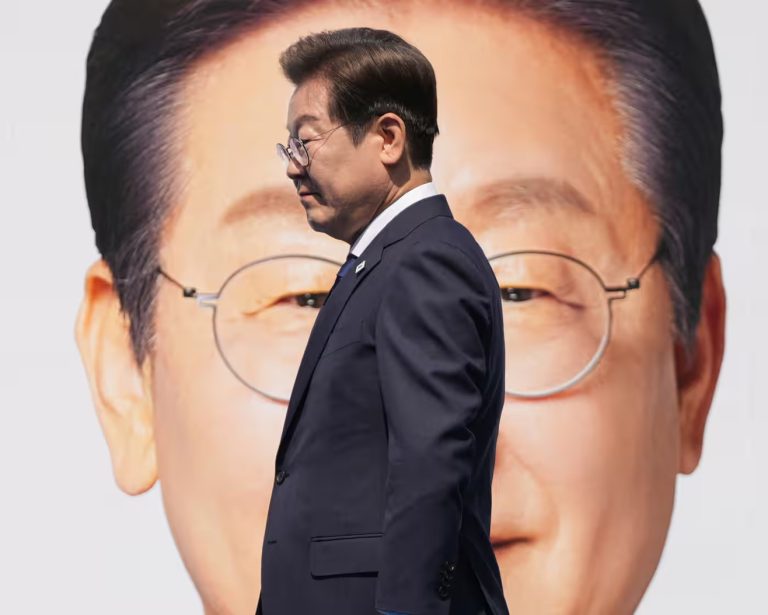After chaos of the Yoon era, South Korea turns focus to new leadership
Following six months of extraordinary political upheaval, South Koreans may finally feel a sense of cautious optimism. With the impeachment saga largely behind them, public attention is now turning to bread-and-butter issues — especially the economy — ahead of the presidential election scheduled for June 3.
Economic policy is expected to take center stage in the race to choose Yoon Suk Yeol’s successor. Yoon’s controversial decision to declare martial law in December sparked the nation’s deepest constitutional crisis in decades and ultimately led to his ouster. Now, Asia’s fourth-largest economy — once a regional powerhouse — is grappling with persistent low growth, a rapidly aging population, one of the lowest birthrates in the world, and the lingering effects of U.S. protectionism under Donald Trump.
Yoon’s downfall looms large over the campaign, which officially began this week. As the disgraced ex-president appeared in court for a third time on separate criminal charges, his conservative People Power Party (PPP) was still reeling from internal divisions. After days of public squabbling over its nomination, the PPP finally confirmed Kim Moon-soo, a hardline conservative and former labor minister, as its candidate. He will face Lee Jae-myung of the Democratic Party, who currently holds a commanding lead in the polls.
Lee, who narrowly lost to Yoon in the 2022 presidential race, thanked supporters for backing him during what he described as a long recovery from that “painful defeat.” “This time, I’ll repay your trust with victory,” he told a rally in Seoul. Meanwhile, Kim aims to distance himself from Yoon’s authoritarian legacy and shift attention to urgent economic issues, including surging youth unemployment, a housing crunch, and rising living costs.
“I want to be a president who puts livelihoods first,” Kim told reporters as he launched his campaign at a local market in the capital. “We need leadership focused on the economy and the everyday lives of our citizens.”
While Lee campaigns on a platform of progressive reform, he remains embroiled in legal troubles. He faces multiple criminal charges, ranging from alleged bribery to involvement in a billion-dollar real estate scandal — all of which he denies. Courts have agreed to delay further proceedings until after the election, allowing him to stay in the race.
The PPP’s chaotic selection process underscored the internal fractures exposed by Yoon’s presidency. His attempt to impose martial law in response to what he called “pro-North Korean” influences in the National Assembly led to a swift impeachment. Within two weeks, the Assembly had removed him from office, and the constitutional court later upheld the decision. Yoon now faces trial on insurrection charges, which carry a potential life sentence or even the death penalty — though no executions have taken place in South Korea since 1997.
Kim’s nomination was briefly overturned in early May as party leaders attempted to install former prime minister Han Duck-soo, believing he had a stronger chance of beating Lee. However, rank-and-file members rejected the move, reinstating Kim and warning that further infighting could all but hand victory to the opposition.
Even some PPP supporters voiced frustration over the party’s turmoil. “They’re just tearing themselves apart,” said 52-year-old voter Lee Jung-ja. “Even if they pull together now, it might be too late. All they’ve done is argue. Lee Jae-myung must be loving this.”
If elected, Kim has promised to seek an urgent summit with Donald Trump to renegotiate tariffs and adopt a tougher stance on North Korea. He has also pledged to encourage private investment by making South Korea more business-friendly, while expanding housing support for young families.
Lee, meanwhile, has been campaigning in a bulletproof vest, citing threats allegedly linked to a shadowy paramilitary group with ties to past authoritarian regimes. After surviving a stabbing attack during a press event in January 2024, Lee said the protective gear reflected how divided the country had become: “We’ve reached a point where a presidential candidate must wear a bulletproof vest to speak to voters.”
Lee’s economic platform includes boosting growth through artificial intelligence and cultural exports, such as music and film, which have become key revenue drivers. He has also proposed tax breaks to encourage higher birthrates and more support for young families.
In foreign policy, Lee has called for a revival of engagement with North Korea, even as Pyongyang forges deeper ties with Russia and continues to expand its nuclear arsenal.
In a recent editorial, the Korea Herald said Yoon’s removal from office left little room for policy debate and warned against polarization. “The next president won’t just inherit a divided government,” it wrote. “They’ll be tasked with rebuilding trust in institutions, stabilizing the economy, and steering the nation through a shifting global landscape. It’s a formidable mission.”
With less than three weeks to go, polls suggest Lee is in a strong position. One survey gave him a 14-point lead over Kim, while another showed a tighter race, but still with Lee ahead by over 10 points.

